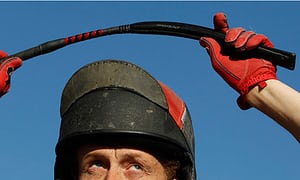Resistance to change is a human trait. When the dozen-strikes crop rule was introduced in May, the debate raged. Today we have moved on to other flashpoints and with only one local rider having been fined for exceeding the limit in the past three meetings, our jockeys also seem to have gotten with the programme.
In the early stages of the amendment to NHRA Guideline M, relating to the use of the crop, and which put a maximum strike limit of twelve for the duration of any one race, a racemeeting didn’t pass without two or three riders being fined or suspended.

The count-to-twelve requirement was seen by some as an albatross around the necks of the jocks and the stipes – and a cash generator for the racing regulator.
But it seems, like most things in life, there was fair method in the madness and the jockeys have adjusted – life goes on.
In a brief chat with veteran Cape Stipendiary Steward Cecil van As, a top jockey in his time for almost four decades, it’s clear that the amendment has been a positive one.

Cecil van As – man with plenty of experience
“Any change takes some getting used to. I feel that our jockeys have adjusted and adapted well to the rule and, if anything, it has had the positive spin-off of getting the guys to think more and utilise the whip in a more constructive manner – and to save it for a time when they need it most. In other words the old style of a few solid cracks to get a horse into the race may now be achieved with a concerted push of the hands. It just gets the guys thinking – and let’s face it, if a horse hasn’t responded to twelve cracks, it’s unlikely he is going to produce any better effort with say fifteen smacks,” the experienced rider pointed out.
Cecil confirmed that only strikes with the hand off the rein counted.
“In other words, the tap down the neck with both hands down the rein is used to good effect.”
When asked how much things had changed since his days in the saddle, he was unequivocal – ‘plenty’.
“The world’s a different place. Welfare and the way it is managed is vital for the improved public perception of the sport. We weren’t limited to total strikes when I rode – except on the consecutive strides monitoring aspect. And the crop in those days was the ‘2yo whip’. It had tassles, and was nothing like the modern horse-friendly crop of today. It also cost a fraction of today’s scientifically designed tool – but then what doesn’t cost more today?” he mused.
So while our local crop debate may have subsided, we are still ahead of some jurisdictions in the liberal sector. British racing continues to face challenges – and even threats that the debate could become a political leverage tool.

Their rules allow whip use to a maximum of seven times in a race on the Flat and eight times over jumps. The maximum permitted level of use is the same in Ireland, while in France, the limit has recently been reduced to just five strokes.
And a group called Animal Aid have stepped up their campaign to ban the persuader and achieve their apparent ultimate aim of bringing an end to the sport in Britain.
Anti-whip messages have been splashed on 25 London buses – a campaign labelled a gimmick by the British Horseracing Authority. The slogan states: “You wouldn’t hit a dog, so why are jockeys allowed to whip race horses?”
Previously Animal Aid has sought to influence public opinion. They successfully forced a debate in parliament in 2018 about the formation of a new, independent equine welfare body after an online petition garnered 100 000 e-signatures.
In a press release issued on Wednesday, the BHA reaffirmed its commitment to high standards of horse welfare.
They pointed out that the design of the whip is foam-padded and energy absorbing, and that only one horse has been marked or ‘wealed’ in each of the last two years – and none the previous year. That means only two horses have been marked from in excess of 225 000 runners in the last three years.
Read more – click on the image below









